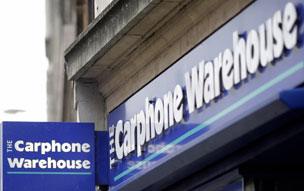What do Lloyds and Carphone teach us?
- Published
- comments

There are two stories today of big corporate deals done in 2008 bearing some kind of fruit in the spring of 2013.
And what has emerged, not all of it juicy and succulent, tells us something about the soil of rather uneven quality that is today's British and global economy.
So, for example, in April 2008 Carphone Warehouse sold half of its core operation to the US electronics giant Best Buy for £1.15bn.
And although that core business has done OK since then, and it is in one bit of retail that doesn't look too hairy (smartphones and tablets), Best Buy itself has not done so brilliantly. And to state the obvious, British and European retail isn't exactly flavour of the month with investors, for all the obvious reasons.
So Carphone is buying back that half share for less than half what Best Buy paid. Which looks like a pretty nice job for the company created by Charles Dunstone - who is about £30m wealthier this morning, as a result of an 11% rise in Carphone's share price.
And then there is Lloyds, which rather controversially reinforced its position as the UK's largest retail bank towards the end of 2008, with the rescue takeover of ailing HBOS.
With its massive market power, there was always going to be a strong profits recovery at Lloyds - although the past few years have probably seen the worst case of indigestion from one British company swallowing another, as losses on HBOS's reckless lending have been eye-poppingly vast.
Years later than Lloyds' management hoped, that recovery has arrived, with underlying profits trebling in the first three months of the year to £1.5bn, and statutory or official profits increasing more than seven times to £2bn.
The recovery has been at some cost to lives and British prosperity, with tens of thousands of job losses, curtailed lending and the disposal of poor quality assets.
But Lloyds insists it is supporting the British economy again - with net lending to small businesses rising against the trend of what other banks are doing, and overall lending down only a fraction.
Big profits also means substantial tax payable, of £500m for the three months, most of it to the UK Exchequer (although I am unclear whether much of that will actually turn up in the government's coffers for some years, given that for the time being Lloyds can presumably minimize its tax payments by utilising - to use the jargon - all those enormous tax losses generated by HBOS loans that went bad).
And Lloyds' rehabilitation brings forward the day when taxpayers' 39% stake in the bank can be privatized. If, as seems likely, regulators allow Lloyds to resume dividend payments in about 2015, sale of at least some of the state's holding should take place around that time.